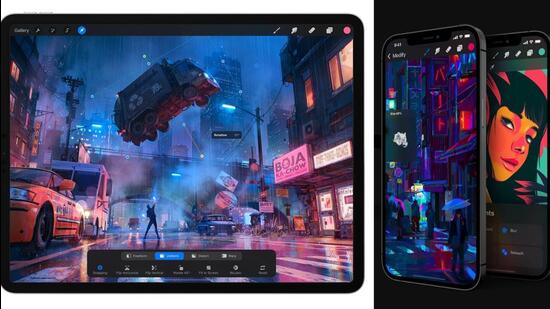Aug 20, 2024 10:45 AM IST
This approach comes in stark contrast to Procreate’s rivals, Adobe and Canva, with the high-risk approach gives users choice of apps that aren’t reliant on generative AI, and worthy of praise
Going against an overpowering flow takes some courage and clarity of thought. For tech companies, and in particular the creative platforms they’ve created, the march of generative artificial intelligence (AI) over the past year has been relentless. Image and video editors, illustration and animation apps, even the photo gallery app in your phone, have found themselves wrapped in an ever-thickening layer of AI. The outlier, and it got our collective attention immediately, is Australian tech company Savage Interactive. They build the Procreate apps, and they’re insisting that they’ll not insert any generative AI smarts into these apps.

“AI is not our future” and “we’re never going there”, are strong-worded assertions by CEO James Cuda. That’s before an official statement further states, “Generative AI is ripping the humanity out of things. Built on a foundation of theft, the technology is steering us toward a barren future.” The company has a portfolio of three apps, the popular Procreate illustration app for the Apple iPad, animation app Proceate Dreams that’s also exclusive to the iPad and the iPhone optimised Procreate Pocket.
This would be, at least as long as it persists (and we’d hope it’s a long time), in stark contrast to their immediate competition. This means there are now two very distinct approaches in play within the industry, the other signified by the examples of Adobe and Canva. The former has steadily integrated the Firefly generative AI capabilities in the apps including Photoshop, Illustrator and Lightroom. Canva too has made it clear AI will permeate through the Affinity art suite as well, something we’ve already seen extensively with recent Magic Studio updates.
“I really f****** hate generative AI,” Cuda said in a video that’s been shared by Procreate’s official X handle. It certainly gets the message across from the tech company that has been making the definitive illustration app for the iPad for years (its remained a top-selling paid app on the App Store over the past 7 years), and was established in 2011. “I don’t like what is happening to the industry and I don’t like what it is doing to artists. We are not going to be introducing any generative AI into our products,” adds Cuda.
Also Read:Art and iPad: AR, algorithms and coding give artists more tools to work with
Procreate says there will also be no changes to the data and privacy policies, which means they will not have access to any artist’s creations. Adobe, one of Procreate’s main competitors, announced new terms of service this summer, which would allow them to access any content created using their apps through “through both automated and manual methods” – they have however since clarified that user data is not being used to train AI models.
If you’d been following this space closely, Procreate’s move is clearly in tune with what a lot of users and creatives are demanding. A couple of years ago, Japanese illustration app Clip Studio Paint, owned by Celsys, had to withdraw plans to integrate an AI image generator within the app.
Another reason why Procreate remains popular with users is the one-time subscription methodology dictating their premium play – think of it as a one-time, lifetime subscription. The Procreate app for iPad costs ₹1,299 while Procreate Pocket for the iPhone costs ₹599. It is a similar approach with Procreate Dreams, priced at ₹1,999.
Cuda and Procreate know the risks of the move they’ve made. “In this technological rush, this might make us an exception or seem at risk of being left behind. But we see this road less travelled as the more exciting and fruitful one for our community,” they say. No risk, no reward, as they say.
The fact remains that digital art platforms now seem to be adopting two very distinct approaches – one which is quite heavily reliant on AI, and another that isn’t. For users, there’s now greater choice to choose what they’re most comfortable with. That said, Procreate’s high profile announcement about shunning generative AI, could potentially provide momentum for more players in the industry to follow suit.


